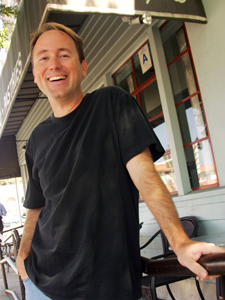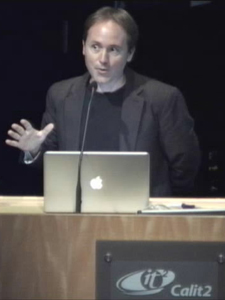Three Degrees of Influence: The Impact of Social Networks
By Tiffany Fox, (858) 246-0353, tfox@ucsd.edu
San Diego, CA, June 19, 2009 — Bucket brigades, telephone trees, military squadrons ... they're all types of social networks that use human relationships to achieve a measurable result.
|
But do human relationships also have a measurable effect on social ills, like obesity, nicotine addiction and loneliness? And if they do, how can those connections be enhanced for the common good?
These questions are the pretext for a series of ground-breaking studies being led by the University of California, San Diego's James Fowler, an associate professor in UC San Diego's Department of Political Science, in collaboration with his colleague Nicholas Christakis of the Harvard School of Public Health. Fowler — who is also affiliated with the Center for Wireless and Population Health Systems at UCSD's California Institute for Telecommunications and Information Technology (Calit2) — is examining the influence that people wield over one another in a wide range of human contexts. He presented some of his findings at Calit2's quarterly staff meeting, held earlier this month at the institute's headquarters in Atkinson Hall.
"The kinds of networks we live in are formed by a single decision: To become friends or form a family," Fowler explained. "But the multiple choices we make create great complexity and variation within networks. These networks and their purpose are what drive our research. In essence, we want to know how these networks make us human."
Rather than undertake an expensive longitudinal study of their own creation, Fowler and Christakis secured access to data from the famed Framingham Heart Study, which began in 1948 with 5,209 adult subjects from Framingham, Mass., and is now on its third generation of participants.
Although the study's primary focus is to collect data about the effects of diet, exercise and medicine on heart disease, its methodology — which asks participants to reveal detailed information about their lives, including the name of a close friend — has provided Fowler and Christakis with a wealth of data about the participants' social connections.
The "dynamic duo" (as they've been dubbed by Science magazine) have found, for example, that if a person is obese, the likelihood that a close friend will also be obese is 50 percent. At two degrees separation (a friend of your friend is obese, for instance), the likelihood is 20 percent, and at three degrees of separation, it falls to 10 percent.
Fowler calls this finding the "Three Degrees of Influence Rule" — a phenomenon he and Christakis outline in detail in their upcoming book Connected: The Surprising Power of Social Networks and How They Shape Our Lives. The book also examines the influence of social networks on alcohol abuse, depression, and even the propensity to cooperate with others.
"We've found that friends can influence friends to gain weight or lose weight, for example, but there's an inherent limit on how much you can influence other people," noted Fowler. "With happiness, people who are at the center of social networks tend to be happier, and those that become more central to their networks become more happy. With smoking, we found that smokers tend to get pushed to the outside of their social networks.
"With loneliness," he continued "it's about your position in social networks. Lonely people are frequently at the edges of social networks, but their loneliness also threatens people in the center of those networks, like a crocheted sweater that's become unraveled at the edges."
|
Of course, genetics also play a role in a person's tendency to be depressed or overweight. But do genes also have an influence on our social networks? That's another area of research Fowler and Christakis have undertaken. By comparing the social networks of identical and fraternal twins who were raised both together and separately, the researchers hope to rule out the effects of shared and unshared environments to learn if genes play a part in the social connections (or lack thereof) that a person forges throughout their life.
"If it's true these identical twins have similar social environments, that suggests that genes are playing a role in social networks," Fowler said. "Already we've found that 45 percent of variation can be attributed to genes when it comes to 'in-degree' relationships, or how many people name you as a friend. We've also found that transitivity (the probability that your friends know each other) is about 45 percent heritable. What this means is that your genes have an influence on whether or not two other people are friends."
Fowler is hoping to translate these results into an upcoming study planned in collaboration with UC San Diego's Office Student Research and Information (SRI). Each year, SRI surveys thousands of UCSD undergraduates to conduct its annual "Undergraduate Student Profile," which documents everything from students' ethnicities to their fields of study and enrollment in study abroad programs. Fowler plans to work with SRI to incorporate questions about social networks in the surveys, which should reveal, over time, how the undergraduates' social connections evolve and expand while they are students at UCSD.
Eventually, Fowler says, studies like these can help scientists understand how to use social networks to create positive impacts on peoples' health. By collaborating with such entities as Calit2's Center for Wireless and Population Health Systems, Fowler hopes to help develop social network-based applications that can use the "Three Degree of Influence Rule" and other research findings to encourage individuals (and their friends) to develop healthy habits.
"Since the 18th century, we've been making progress with research into social systems," he noted "What was taken from (economist) Adam Smith's work is that we're all independent, but then the focus shifted to the 'groupthink' of different social classes: The proletariat, bourgeoisie and nobility. In the 20th century, the research suggested that people make independent decisions within groups.
'"But in the 21st century, we've moved away from that assumption of independence," he concluded. "Now we're beginning to realize the importance of the relationships between individuals. We're finding out that your actions really do influence other people."
Media Contacts
Tiffany Fox, (858) 246-0353, tfox@ucsd.edu
Related Links
James Fowler's Web Site
UCSD's Office of Student Research and Information



